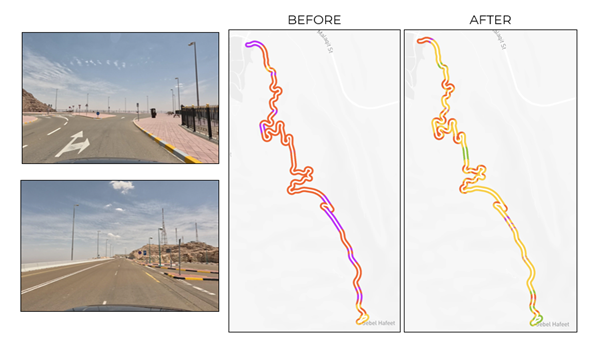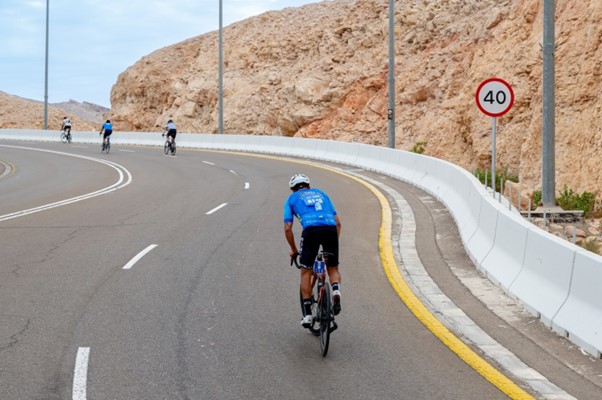Image caption: Cyclist going up a hill in Jebel Hafeet — Source Facebook AD Cycling Club
An infrastructure safety assessment completed for the Abu Dhabi Cycling Club (ADCC) marks the first implementation of CycleRAP in the Middle East, and new approach for safer cycling integration in areas lacking dedicated infrastructure.
The 13 km CycleRAP project, completed by Factual Consulting, aimed to address the unique challenges of assessing and improving cyclist safety in an interurban area missing cycling infrastructure.
Factual’s Lane Patrol tool was used to analyse the safety of current road conditions and simulate safer future scenarios including:
- The addition of cycling infrastructure delineation;
- Light segregation to separate bike lanes from vehicular traffic, enhancing safety without extensive structural changes;
- Implementation of physical barriers, providing an additional layer of protection for cyclists; and
- A 10 km/h speed limit reduction to decrease vehicle speeds and reduce crash risk.
Marc Figuls, Managing Partner of Factual Consulting said, “The feedback from the ADCC has been very positive with the results providing an independent and evidence-based foundation for discussions with local police and policymakers to implement countermeasures to improve road safety.”
“Abu Dhabi is becoming a bike-friendly city and this initiative not only addresses immediate safety concerns but also contributes to the broader goal of integrating cycling as a sustainable and accessible mode of transport within the city,” he said.
The UAE and the ADCC are developing steps to improve the safety performance of the cycling infrastructures at urban and interurban areas. For instance, the Abu Dhabi city has become the first “bike friendly city” in the Middle East region. The insights gained from the Jebel Hafeet pilot will be invaluable in shaping future projects and expanding the use of the CycleRAP methodology across the region.

Screenshot of the Lane Patrol tool with the assessed itineraries in UAE.
The study concluded provides the current road safety performance of all the road segments of the Jebel Hafeet Road and also the potential countermeasures that can improve this infrastructure for the active mobility users. Also, the simulation tool showed that a road safety barrier (infrastructural change) and including cycling delineation while reducing the operation speed (soft measures) could reach the same level of safety for cyclists.
Lane Patrol and CycleRAP joined forces to enhance cycle safety
FACTUAL and Lane Patrol have a proven track record of successful bicycle assessment projects in various cities worldwide, including Barcelona, Madrid, Montevideo, Copenhagen, Oxford and Skopje.
Factual is a Trusted CycleRAP Supplier and these projects have demonstrated the effectiveness of the CycleRAP methodology in improving road safety and reducing crashes in very different contexts at urban and interurban levels.
The Lane Patrol tool, developed by Factual, offers data-driven insights to identify potential hazards and improve cycling infrastructure, helping to reduce crashes and injuries. It helps policymakers, city planners, and mobility experts understand the state of existing and new infrastructure, prioritise and plan updates, and communicate results based on data-driven objective data.
When mounted on a bike, the Lane Patrol mobile app automatically captures georeferenced images of the cycling infrastructure. These are later synchronised with the web tool, which utilises vision models to assess safety with over 40 parameters, such as lane width, delineation, protective barriers, and obstacles. Leveraging the CycleRAP methodology, Lane Patrol automatically defines the level of risk for bicyclists and other light mobility users by identifying high risk locations without the need for crash data and develops before/after simulations to provide evidence-based information for planning the cycling network.
For more information on CycleRAP, visit irap.org/cyclerap/

















